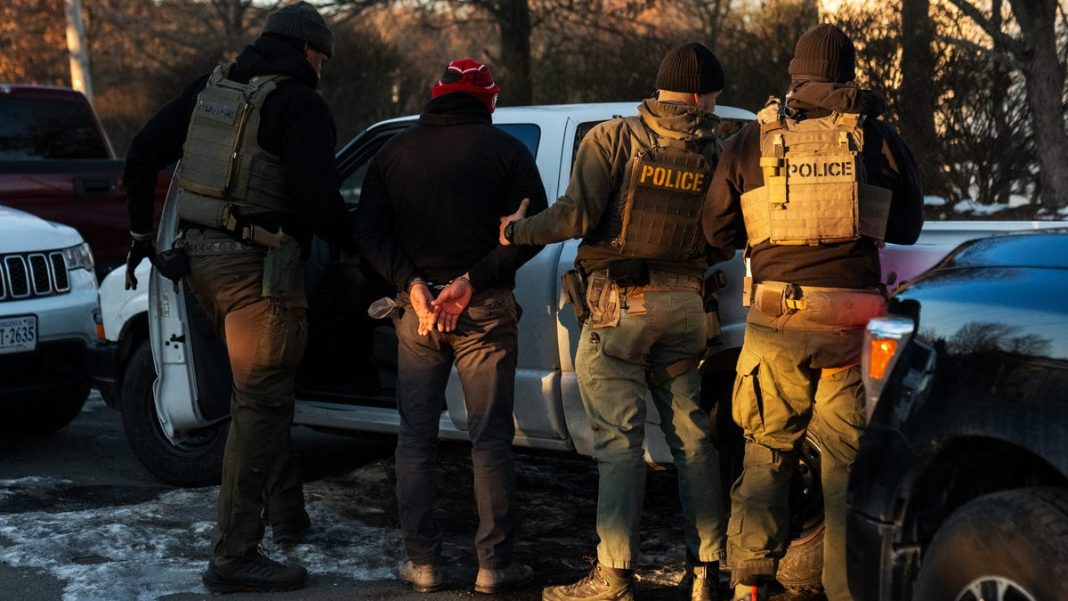Trump Resumes Efforts to Denaturalize U.S. Citizens
Previously, immigrants who became U.S. citizens could only lose their citizenship under specific circumstances, such as if they concealed their involvement with Nazi activities, were connected to terrorism, or provided false information on their application. These cases rarely involved more than a handful of individuals each year.
This situation changed during President Donald Trump’s initial term, as he initiated a campaign aimed at denaturalizing thousands of immigrants who had obtained U.S. citizenship, even though the initiative fell short of its targets. Just last week, Trump renewed this agenda by mandating that “adequate resources” be allocated to denaturalize certain U.S. citizens, as a part of a broader strategy to tighten immigration policies.
Among the elements outlined in his first-day executive orders was a brief mention of enforcing a provision of immigration law, which permits the government to revoke citizenship if it was “unlawfully procured.”
This directive was included in an order titled “Protecting the United States from Foreign Terrorists and Other National Security and Public Safety Threats.” Amanda Frost, a law professor and immigration lawyer at the University of Virginia, pointed out that this signals an intention to include denaturalization in his upcoming clampdown on immigration.
“We witnessed the impact of this during his first term,” Frost noted. “Significant resources were committed to denaturalization.”
Trump’s latest directive received minimal attention amidst a flurry of high-profile actions aimed at his promised “mass deportation.” In his first week, he declared a national border emergency, deployed 1,500 troops to the border—including combat personnel—and authorized numerous federal law enforcement officers to arrest immigrants, among other initiatives.
Nonetheless, this understated back-office directive has raised concerns among immigrant advocates, especially given the extensive reach of the administration’s earlier efforts.
“Since these executive orders were enacted, there has been widespread fear,” expressed Gintare Grigaite, an immigration attorney from New Jersey who successfully challenged a denaturalization case during Trump’s first term. She has been receiving enquiries from anxious clients, including those who have already secured their citizenship.
“People are curious about all sorts of scenarios,” she shared. “Is there any legal avenue to question someone’s naturalization? If they have been truthful, there should be no cause for worry. If their citizenship was gained appropriately, then they should not fear denaturalization.”
‘Zero Tolerance’ Campaign
During Trump’s first term, then-Attorney General Jeff Sessions initiated an inquiry into 700,000 naturalized citizens, aiming to bring around 1,600 cases to court. This denaturalization drive was part of the administration’s “zero tolerance” strategy, which was infamous for prosecuting border crossers and enforcing family separations.
A spokesman for U.S. Citizenship and Immigration Services (USCIS), the agency that processes citizenship applications, directed inquiries to the White House, which did not reply to an emailed request for comment.
Trump’s original initiative to pursue investigations of naturalized citizens expanded upon a program initiated under President Barack Obama.
The Obama administration shifted from paper to digital fingerprinting, which led Homeland Security officials to uncover numerous cases where naturalized citizens had previously been deported or concealed criminal histories that USCIS could not access. The Obama administration began reviewing these cases, focusing on denaturalizing any citizen linked to foreign terrorist organizations.
Obama’s review targeted individuals with potential connections to terrorist groups, criminal backgrounds, or those who posed national security threats.
“They overlooked common discrepancies in individuals’ immigration histories,” remarked Cassandra Burke Robertson, a law professor at Case Western Reserve University, who studies denaturalization efforts. “The Trump administration altered this approach by increasing resources allocated to the program. Their directive was to pursue denaturalization for anyone with conceivable grounds for it.”
This included looking at “discrepancies in the records—be they typographical errors or innocent mistakes in the process,” she added.
Research indicates that the first Trump administration never reached its target of referring 1,600 cases for civil or criminal proceedings, which were the two methods for revoking citizenship.
Irina Manta, a law professor at Hofstra University, began compiling a database of denaturalization cases, identifying 168 cases in court during the Trump administration and 64 in the Biden administration, suggesting a slowdown in efforts but not a complete halt over the last four years.
“One would expect that naturalization would be definitive, irrespective of individuals’ actions,” Manta stated. “The government should not be able to revisit this five years later and challenge it.”
Trump’s strategy—advocated by the conservative Heritage Foundation’s Project 2025—has been significantly broader. Mark Krikorian, executive director of the right-leaning Center for Immigration Studies, claimed that a wider approach to uncovering fraud or misrepresentation makes logical sense.
“It’s ensuring that rules are interpreted correctly,” Krikorian asserted. “It has to be expansive since the entire immigration system has been far too lenient.”
‘Targeted, Very Political’ Cold War Campaign
During the anti-communist fervor of the 1950s, the U.S. government wielded its substantial authority to revoke citizenship from immigrants perceived as political adversaries—such as labor leaders, journalists, and government critics accused of being Communists—remarked Frost, the law professor from the University of Virginia.
“It was a very targeted, politically motivated effort during the Cold War,” she stated.
Throughout the two world wars and into the 1950s, approximately 22,000 immigrants had their U.S. citizenship revoked.
The Supreme Court curtailed politically motivated denaturalization campaigns in 1967, ruling that citizenship could only be revoked in instances of fraud or “willful misrepresentation.”
In the quarter-century leading up to Trump’s first presidency, from 1990 to 2017, the U.S. government targeted an average of 11 naturalized citizens annually, based on Frost’s findings.
Most of those individuals had engaged in war crimes or other severe offenses and had lied about their backgrounds to obtain citizenship.
“In the first Trump administration, we noted a significant rise in denaturalization cases,” Burke Robertson commented. “It’s evident that his (new) administration appears to be picking up where they left off.”

